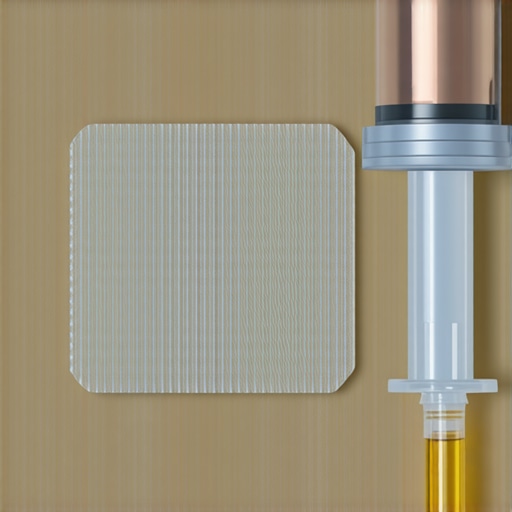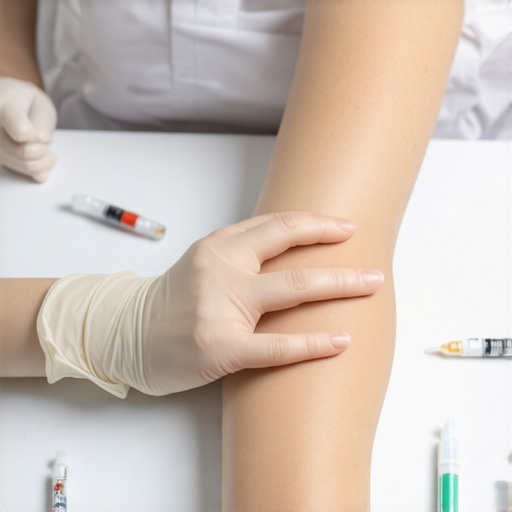Injecting Confidence: Navigating the Bumps and Bruises of Weight Loss Shots
If you’ve ever dared to embark on the journey of injectable weight loss treatments, you know it’s not just about the magic pill—it’s about managing the little quirks along the way. One of those quirks? Injection site reactions and discomfort, which can feel like unwelcome guests at your weight loss party. But fear not! With a sprinkle of expert tips and a dash of common sense, you can keep these at bay and stay focused on your goals.
The Not-So-Secret Art of Handling Injection Site Reactions
Let’s face it: nobody enjoys a sore, swollen, or itchy injection site. It’s like the body’s way of saying, ‘Hey, I didn’t sign up for this!’ But understanding why these reactions happen can demystify the process. Sometimes, your skin is just overreacting to a tiny needle prick, or perhaps the medication is a bit too harsh for your skin’s taste. The good news? There are proven strategies to minimize these reactions, making your weight loss journey more comfortable and less frustrating.
Could Your Injection Technique Be the Culprit?
One of the most common causes of site reactions is improper injection technique. Are you injecting at the right angle? Are you rotating sites to prevent tissue irritation? These might seem like small details, but they matter. Experts recommend rotating injection sites—think of it as your body’s way of spreading the love—and ensuring the skin is clean and dry before injection. For more detailed tips, check out our comprehensive guide.
Discomfort and Swelling: When to Call in the Pros
Some discomfort is normal, like a dull ache or a slight redness that fades within a day or two. But if you experience persistent swelling, intense pain, or signs of infection such as pus or fever, it’s time to seek medical advice. Remember, safety first! Consulting your healthcare provider ensures you’re on the right track and can help troubleshoot stubborn reactions.
Are Your Lifestyle Habits Sabotaging Your Injection Experience?
Believe it or not, your daily routines can influence how your skin responds. Hydration, proper nutrition, and avoiding alcohol before injections can all play a role in minimizing side effects. Plus, keeping a journal of your reactions can help your doctor tailor the best approach for you. Curious to learn more about optimizing your weight loss injections? Visit our supervised injection strategies.
As always, the key to safe and effective weight loss therapy is open communication with your healthcare team. They can provide personalized advice, recommend the best injection techniques, and help you navigate any discomfort with confidence.
Want to share your injection stories or ask questions? Drop a comment below! Your experiences could light the way for others on this journey.
And remember, science backs up these practices—according to recent studies, proper injection technique and site management can significantly reduce adverse reactions (see here for detailed research). So, stay informed, stay safe, and keep pushing toward your weight loss goals with confidence!
Can Small Lifestyle Tweaks Make a Big Difference in Your Injectable Weight Loss Journey?
Absolutely! While prescription injections like Wegovy or Ozempic are powerful tools, they work best when complemented by mindful lifestyle choices. Simple habits such as maintaining proper hydration, ensuring balanced nutrition, and managing stress levels can significantly enhance your body’s response to these medications.
For instance, staying well-hydrated not only supports overall health but also helps reduce injection site discomfort and minimizes the risk of side effects. Similarly, a nutrient-dense diet rich in fiber, lean proteins, and healthy fats can stabilize blood sugar levels and curb appetite, making your medication’s effects more pronounced. Avoiding alcohol before injections is another key recommendation, as alcohol can dehydrate the body and impair healing processes.
Implementing routine physical activity, even gentle walks, can boost metabolic rate and improve insulin sensitivity, further amplifying the benefits of your injectable treatment. When you combine these lifestyle strategies with proper medication use, your chances of achieving sustainable, long-term weight loss increase exponentially.
How Do Your Daily Habits Shape Your Weight Loss Results and What Can You Do About It?
Think about your daily routines—are they aligned with your weight loss goals? Small adjustments in habits can lead to significant improvements. For example, tracking your reactions and progress in a journal can help identify patterns or triggers that affect your response to injections. This practice allows your healthcare provider to tailor your approach more effectively. To deepen your understanding, check out our supervised injection strategies.
Moreover, integrating lifestyle changes with your medication regimen can prevent plateaus and promote lasting results. Combining dietary modifications, physical activity, and stress management creates a holistic approach that addresses both the biological and behavioral aspects of weight loss.
It’s worth noting that scientific research supports these practices. A recent review emphasizes that comprehensive approaches—including lifestyle interventions—are essential for optimal outcomes with GLP-1 receptor agonists like semaglutide and tirzepatide (see here for detailed research).
So, why not start today by evaluating your habits and making small, manageable changes? Your future self will thank you for the effort!
Have you tried combining lifestyle adjustments with your injectable weight loss plan? Share your experiences or ask questions in the comments below—your insights could motivate others! And don’t forget to explore our comprehensive guides on incorporating lifestyle changes for better results.
Understanding the Complexities of Injection Site Reactions: Beyond the Basics
While common advice emphasizes proper technique and site rotation, emerging research indicates that individual genetic factors and skin microbiome diversity can significantly influence reaction severity and duration. A groundbreaking study published in The Journal of Clinical Endocrinology & Metabolism (2023) highlights that patients with specific genetic polymorphisms in inflammatory pathway genes tend to experience more pronounced reactions, suggesting a future where personalized medicine could tailor injection protocols for optimal comfort and safety.
Innovative Techniques and Technologies to Elevate Injection Comfort
Technological advancements are opening new frontiers in injection therapy. Micro-needle patches and jet injectors are gaining attention for their potential to reduce pain and tissue trauma. For example, micro-needle arrays, which consist of hundreds of tiny, painless needles, can deliver medication uniformly while minimizing skin irritation. Additionally, emerging cold-preservation devices can be used to numb the skin pre-injection, significantly reducing discomfort. Experts recommend exploring these options with your healthcare provider, especially if you have a history of severe reactions.
Can Nutritional and Lifestyle Interventions Modulate Inflammation at Injection Sites?
Interestingly, recent insights suggest that systemic inflammation levels, influenced by diet and lifestyle, may impact local skin reactions. Diets rich in omega-3 fatty acids, antioxidants, and anti-inflammatory phytochemicals (found in berries, turmeric, and green leafy vegetables) can modulate cytokine responses, potentially reducing injection site inflammation. Moreover, stress management techniques such as mindfulness meditation and adequate sleep have been shown to lower systemic inflammatory markers, thus possibly mitigating local adverse reactions. Integrating these strategies into your routine could enhance both your overall health and comfort during weight loss treatment.

Image depicting micro-needle patch application on skin, highlighting minimally invasive delivery method.
Addressing Persistent or Severe Reactions: When to Seek Specialized Care
Not all reactions are created equal. While mild redness and swelling typically resolve within a few days, persistent or worsening symptoms warrant prompt medical attention. Signs such as increasing pain, blistering, necrosis, or signs of systemic infection like fever or chills should be evaluated by a healthcare professional. In some cases, allergy testing may identify hypersensitivity to medication components, leading to alternative treatment plans or desensitization protocols. Remember, proactive management and open communication with your provider are essential for a safe weight loss journey.
Personalized Approaches: The Future of Injection Site Management
Looking ahead, integrating personalized medicine into weight loss injectables could revolutionize side effect management. Genetic screening for inflammatory response profiles, combined with skin microbiome analysis, might enable clinicians to customize injection techniques, site selection, and adjunct therapies. Furthermore, the development of smart injection devices equipped with sensors to monitor tissue response in real-time promises to optimize delivery and minimize adverse effects. Staying informed about these innovations can empower you to participate actively in your treatment plan.
Are you curious about how personalized strategies could transform your weight loss experience? Consult with your healthcare team about emerging options and consider participating in clinical trials exploring these cutting-edge approaches. Your journey toward healthier living can be safer, more comfortable, and scientifically optimized.
Unraveling the Genetic and Microbiome Factors Influencing Injection Reactions
Emerging research in personalized medicine reveals that genetic polymorphisms, particularly in genes regulating inflammatory pathways, can predispose individuals to more severe injection site reactions. A pivotal study published in The Journal of Clinical Endocrinology & Metabolism (2023) underscores the importance of genetic screening to tailor injection protocols, minimizing discomfort and optimizing safety. Furthermore, the skin microbiome— the diverse community of microorganisms residing on your skin— also plays a crucial role in modulating inflammatory responses. Disruptions or imbalances in this microbiome can lead to heightened reactivity, suggesting that pre- and post-injection skin care, including probiotics or targeted topical treatments, could become future adjuncts in managing side effects.
Innovative Technologies Paving the Way for Pain-Free Injections
Advancements in medical device technology are transforming injection experiences. Micro-needle patches, which deliver medication through arrays of tiny, painless needles, are gaining popularity for their ability to reduce tissue trauma and discomfort. Similarly, jet injectors, employing high-pressure streams to administer medication without needles, offer promising alternatives for those with needle phobia or sensitive skin. Experts recommend discussing these options with your healthcare provider to determine their suitability for your treatment plan, potentially increasing adherence and satisfaction.
Can Dietary and Lifestyle Modifications Modulate Local Inflammation?
Yes, systemic inflammation influenced by diet and lifestyle can significantly affect local skin reactions. Diets rich in omega-3 fatty acids, antioxidants, and phytochemicals— such as berries, turmeric, and green leafy vegetables— have anti-inflammatory properties that may reduce reaction severity. Stress management techniques, including mindfulness meditation and adequate sleep, further lower inflammatory markers, creating a more favorable environment for injection tolerance. Incorporating these strategies can not only improve your overall health but also enhance your response to weight loss injections.
How Do Systemic Anti-Inflammatory Strategies Impact Local Injection Reactivity?
Research indicates that systemic anti-inflammatory interventions— including omega-3 supplementation or herbal anti-inflammatories— might attenuate localized tissue responses. A comprehensive review in science-backed literature suggests that reducing baseline inflammation can lead to fewer and milder injection site reactions, promoting a smoother treatment course. Engaging in routine physical activity and maintaining a balanced diet are practical ways to support these anti-inflammatory effects. Have you noticed how lifestyle changes have influenced your treatment experience? Share your insights and join the conversation!
< >
>
Image illustrating skin microbiome diversity and its role in inflammation regulation, highlighting personalized approaches to injection comfort.
Future Directions: Personalized and Smart Injection Solutions
The future of injection site management lies in personalized protocols tailored to individual genetic and microbiome profiles. Advances in genomic testing and skin microbiome analysis will enable clinicians to predict reaction risks and customize injection techniques accordingly. Additionally, smart devices equipped with sensors could monitor tissue response in real-time, adjusting delivery parameters to minimize adverse effects dynamically. Participating in clinical trials exploring these innovations could offer early access to safer, more comfortable weight loss treatments.
Are you interested in how personalized medicine might revolutionize your weight loss journey? Discuss with your healthcare team about emerging options and consider contributing to ongoing research for a safer, more effective future.
Expert Insights & Advanced Considerations
1. Personalized Medicine Approaches Are the Future
Emerging research indicates that genetic polymorphisms and individual microbiome profiles significantly influence injection site reactions. Tailoring injection protocols based on genetic and microbiome analysis can optimize safety and comfort, making treatments more effective and less distressing for patients.
2. Technology Is Revolutionizing Injection Comfort
Innovative devices such as micro-needle patches and jet injectors are reducing pain and tissue trauma. These technologies, combined with cold-preservation methods for numbness, are setting new standards for patient experience and adherence to treatment regimens.
3. Systemic Inflammation Modulates Local Reactions
Diet and lifestyle modifications—rich in omega-3s, antioxidants, and stress reduction—can lower systemic inflammation, thereby decreasing local skin reactions. Integrating these strategies into weight loss programs can enhance overall outcomes and patient satisfaction.
4. Future Personalization and Smart Devices Will Optimize Outcomes
Advances in genomic testing and skin microbiome analysis will enable precise, personalized injection protocols. Smart injection devices with real-time tissue monitoring are on the horizon, promising to minimize adverse effects and improve efficacy.
5. Managing Reactions Requires a Multidisciplinary Approach
Combining expert medical guidance, technological innovations, and lifestyle interventions creates a comprehensive strategy for managing injection site reactions, ensuring safety, comfort, and sustained weight loss success.
Curated Expert Resources
- Journal of Clinical Endocrinology & Metabolism (2023): Contains groundbreaking studies on genetic and microbiome influences on injection reactions, providing insights into personalized treatment approaches.
- Advances in Micro-Needle and Jet Injector Technologies: Research articles and reviews detailing the latest innovations aimed at reducing injection discomfort and improving delivery efficiency.
- Nutrition and Lifestyle for Inflammation Modulation: Expert guidelines and clinical studies demonstrating how diet and stress management can influence inflammation and skin reactions at injection sites.
- Future of Personalized Injection Protocols: Industry reports and clinical trial data on genomic and microbiome-based customization, along with smart device integration for real-time monitoring.
Final Expert Perspective
Progress in managing injection site reactions for weight loss therapies hinges on integrating cutting-edge science, innovative technology, and holistic lifestyle strategies. As the field advances, personalized medicine and smart devices will transform patient experiences, making treatments safer, more comfortable, and ultimately more effective. For those committed to long-term success, staying informed and collaborating closely with healthcare providers is essential. Curious about how these innovations can enhance your weight loss journey? Reach out to your medical team or explore trusted resources and contribute your insights to the evolving conversation—your experience can help shape the future of safe, effective weight management.
,

